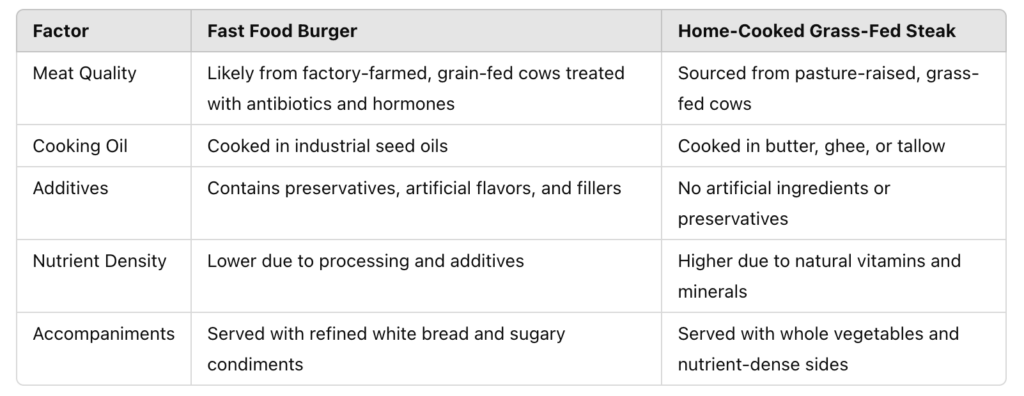Why Tart Cherry Is the…
Blog by Sherry Larson Why Tart Cherry Is the Natural…
Table of Contents
Toggle
For years, the mainstream narrative has linked red meat consumption to colon cancer, leading many to believe that eating beef or other red meats poses a significant health risk. However, this claim often overlooks a crucial factor—what kind of red meat is being consumed and how it is prepared. The image of a McDonald’s burger and fries humorously highlights this problem, implying that the ultra-processed nature of fast food, rather than red meat itself, is the real issue.
While some epidemiological studies suggest a correlation between red meat and colon cancer, the science is far from conclusive. The real health threats come from industrial processing, artificial additives, seed oils, and refined carbohydrates. Let’s dive deeper into this topic and uncover the real factors contributing to disease.
Understanding the Studies: Is Red Meat Really to Blame?
The claim that red meat causes colon cancer primarily comes from observational studies, which can only show correlation, not causation. Many of these studies fail to control for other lifestyle factors, such as:
Further, these studies often rely on food frequency questionnaires, which require participants to recall what they ate over months or years. This method is prone to error and does not account for overall dietary patterns, making the association between red meat and colon cancer weak at best.
Processed vs. Whole Red Meat: The Key Difference
There is a vast difference between eating a fast-food burger filled with additives and consuming a grass-fed steak with a side of vegetables. Studies that lump processed meats (like hot dogs, sausages, and deli meats) together with fresh cuts of beef often misrepresent the true risk factors. Processed meats contain harmful ingredients such as:
On the other hand, grass-fed and properly prepared red meat is rich in essential nutrients, including:
The Real Threat: Ultra-Processed Foods and Seed Oils
If red meat were truly the main driver of colon cancer, we would expect to see high cancer rates in populations that consume large amounts of fresh red meat. However, traditional societies that eat significant amounts of unprocessed red meat, such as the Maasai in Africa or the Mongolian nomads, do not experience higher cancer rates.
Instead, the rise in chronic disease correlates more strongly with the increased consumption of ultra-processed foods, which are loaded with:
Modern diets, which rely on fast food and ultra-processed snacks, provide the perfect storm for metabolic dysfunction. When people eat red meat in the form of a McDonald’s burger, they are also consuming inflammatory seed oils, refined grains, and artificial additives—all of which contribute to obesity, insulin resistance, and cardiovascular disease. Blaming the red meat alone ignores these far more damaging factors.
Fast Food vs. Home-Cooked Red Meat: A Huge Difference
The difference between eating a processed fast-food burger and a home-cooked steak is staggering. Here’s a comparison:

Choosing whole, minimally processed red meat makes all the difference in how it affects the body. Fast food versions of red meat often contain harmful chemicals, while properly sourced and prepared red meat provides essential nutrients without the negatives.
How to Consume Red Meat in a Healthy Way
If you enjoy red meat, there are ways to incorporate it into your diet while minimizing potential risks:
Conclusion: The Fast-Food Illusion
The widespread claim that “red meat causes colon cancer” is misleading when we fail to consider what accompanies that meat. A McDonald’s meal consisting of a processed beef patty, refined white bun, French fries fried in seed oils, and a sugary soda is a far cry from a grass-fed steak with a side of vegetables. The issue isn’t the red meat itself—it’s the processing, additives, and inflammatory ingredients found in ultra-processed foods.
When red meat is consumed in its whole, unprocessed form and paired with a nutrient-dense diet, it can be a beneficial part of a healthy lifestyle. Instead of demonizing red meat, we should focus on reducing our intake of processed junk food, refined sugars, and seed oils—the real drivers of modern disease.
By shifting the conversation from demonizing a single food group to analyzing overall dietary patterns, we can make informed choices that prioritize true health and longevity.
Blog by Sherry Larson Berberine: Nature’s Secret Weapon for Blood Sugar, Inflammation & More If you’re looking for…
Blog by Sherry Larson Shilajit: Nature’s Ancient Energy Tonic for Modern Burnout We’ve all felt it—that sluggish, wired-but-tired…
Blog by Sherry Larson Celery Juice: The Gut-Healing, Liver-Loving Morning Ritual You Didn’t Know You Needed If you’ve ever felt…
Blog by Sherry Larson Milk Thistle: The Detox Defender Your Liver Has Been Waiting For Milk thistle might…
Blog by Sherry Larson The Link Between Ultra-Processed Foods and Cancer: What They’re Not Telling You Every day,…
Blog by Sherry Larson Understanding High Cortisol: Signs, Causes, and Natural Ways to Balance It Cortisol, commonly known…
Blog by Sherry Larson The Truth About Red Meat and Health: Why the Real Culprit May Not Be What You…
Blog by Sherry Larson The Hidden Dangers of Diet Cola: What You Need to Know Diet cola has…
Blog by Sherry Larson 14 Ways to Begin Healing Your Gut and Transform Your Health …
copyright © 2025 Anti-Inflammatory Approach. All rights reserved. Unauthorized reproduction, distribution, or use of any content, including text, images, recipes, or other materials on this website, is strictly prohibited without prior written permission. This website’s content is provided for informational purposes only and does not constitute medical or professional advice.